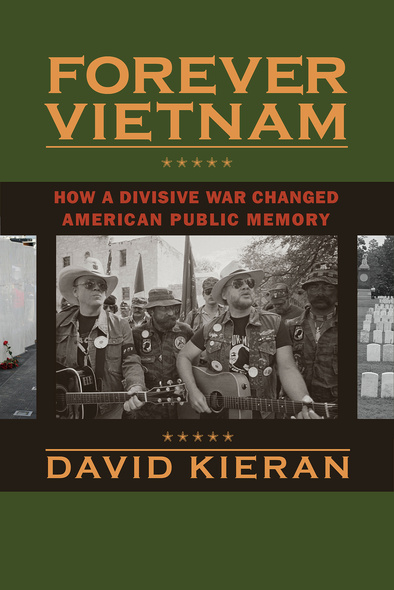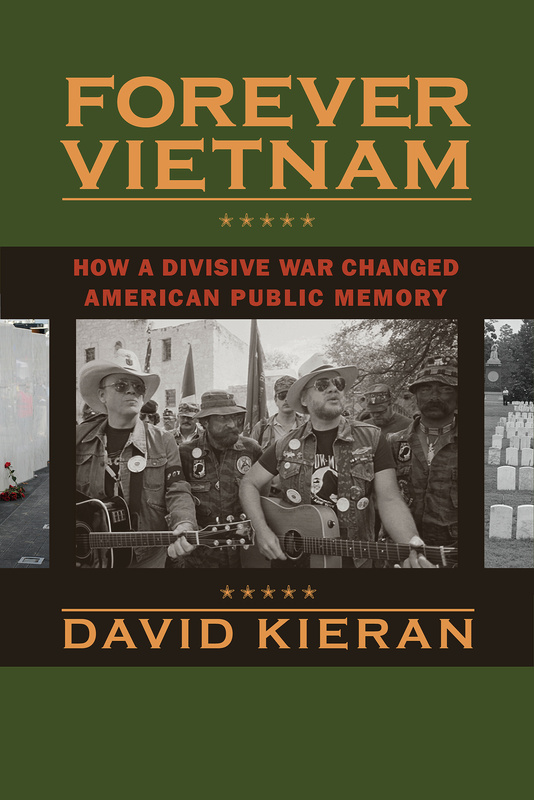Our shopping cart is currently down. To place an order, please contact our distributor, UTP Distribution, directly at utpbooks@utpress.utoronto.ca.
Forever Vietnam
How a Divisive War Changed American Public Memory
By David Kieran
University of Massachusetts Press
Four decades after its end, the American war in Vietnam still haunts the nation's collective memory. Its lessons, real and imagined, continue to shape government policies and military strategies, while the divisions it spawned infect domestic politics and fuel the so-called culture wars. In Forever Vietnam, David Kieran shows how the contested memory of the Vietnam War has affected the commemoration of other events, and how those acts of remembrance have influenced postwar debates over the conduct and consequences of American foreign policy.
Kieran focuses his analysis on the recent remembrance of six events, three of which occurred before the Vietnam War and three after it ended. The first group includes the siege of the Alamo in 1836, the incarceration of Union troops at Andersonville during the Civil War, and the experience of American combat troops during World War II. The second comprises the 1993 U.S. intervention in Somalia, the crash of United Airlines Flight 93 on September 11, 2001, and the Iraq and Afghanistan wars.
In each case a range of actors—military veterans, policymakers, memorial planners, and the general public—used memorial practices associated with the Vietnam War to reinterpret the contemporary significance of past events. A PBS program about Andersonville sought to cultivate a sense of national responsibility for the My Lai massacre. A group of Vietnam veterans occupied the Alamo in 1985, seeing themselves as patriotic heirs to another lost cause. A World War II veteran published a memoir in 1980 that reads like a narrative of combat in Vietnam. Through these and other examples, Forever Vietnam reveals not only the persistence of the past in public memory but also its malleability in the service of the political present.
Kieran focuses his analysis on the recent remembrance of six events, three of which occurred before the Vietnam War and three after it ended. The first group includes the siege of the Alamo in 1836, the incarceration of Union troops at Andersonville during the Civil War, and the experience of American combat troops during World War II. The second comprises the 1993 U.S. intervention in Somalia, the crash of United Airlines Flight 93 on September 11, 2001, and the Iraq and Afghanistan wars.
In each case a range of actors—military veterans, policymakers, memorial planners, and the general public—used memorial practices associated with the Vietnam War to reinterpret the contemporary significance of past events. A PBS program about Andersonville sought to cultivate a sense of national responsibility for the My Lai massacre. A group of Vietnam veterans occupied the Alamo in 1985, seeing themselves as patriotic heirs to another lost cause. A World War II veteran published a memoir in 1980 that reads like a narrative of combat in Vietnam. Through these and other examples, Forever Vietnam reveals not only the persistence of the past in public memory but also its malleability in the service of the political present.
A thoroughly researched, well-written book that advances a bold and original argument, one that involves an engaging way of reading a number of events in U.S. history in relation to memories of the Vietnam War.'—Patrick Hagopian, author of The Vietnam War in American Memory: Veterans, Memorials, and the Politics of Healing
'The most interesting part of Kieran's work was the realization that Vietnam veterans themselves have changed the narrative, raising certain issues in an attempt to place their service within a larger context of meaning, sacrifice, and validity of action. Kieran's goal was to 'illuminate the wider story of how the remembrance of one event has created the conditions according to which Americans have meaningfully remembered other, seemingly unrelated, events.' Overall, he does just that,'—H-Net Reviews
'Leaders and citizens concerned about the US's perpetual wars should find Forever Vietnam a must read. . . . Kieran suggests that failure to question the nation's current involvement in Iraq and Afghanistan may lead to future interventions. Recommended.'—Choice
'This argument is quite original and exceptionally well constructed. . . . Kieran's research is meticulous and his arguments are delineated with care. Moreover, the examination of the six sites centers on specific characters and incidents, treating each in a very individual way, thereby adhering to the process of recognizing the importance of social agency and examining what specific people do to re-enact a commemorative practice and reshape memory.'—David Ryan, International Affairs
'A brilliantly designed study . . . showing the influence of the war's memory in the conduct and recollection of subsequent events.'—American Historical Review
'Elegant, judicious . . . Perhaps the greatest strength of Forever Vietnam is its vast utility, which makes the book as a whole useful to courses on the Vietnam War or post-1945 U.S. history and individual chapters to courses on a slew of military history topics.'—Public Historian
'A fascinating study in that it unveils the shifting and often odd lessons that Americans have made about the war.'—American Studies Journal
'Kieran deftly interweaves historical and literary analysis to reveal how multiple narrations of the Vietnam War have shaped ideas of the conflict and of U.S. history. . . . [T]his creative, bold, insightful book should be required reading for those interested in war, memory, militarism, and the recent history of the United States.'—Journal of American History
'Kieran's study goes well beyond the obvious, and details Vietnam's evolving legacy within the scope of American culture, commemoration, and foreign policy in which it is intertwined. Kieran builds on past scholarship to convincingly argue that the Vietnam legacy in not simply a symbol of disastrous intervention, but has evolved over time to become a tool for uncritical celebration of the U.S. military and its interventionists policies as much as it has been used to critique those very same policies.'—On Point: The Journal of Army History
'Deft. . . . The strength of this book is its author's demonstration of the malleability of America's Vietnam.'—Michigan War Studies Review
David Kieran is visiting assistant professor of American studies at Franklin and Marshall College.





